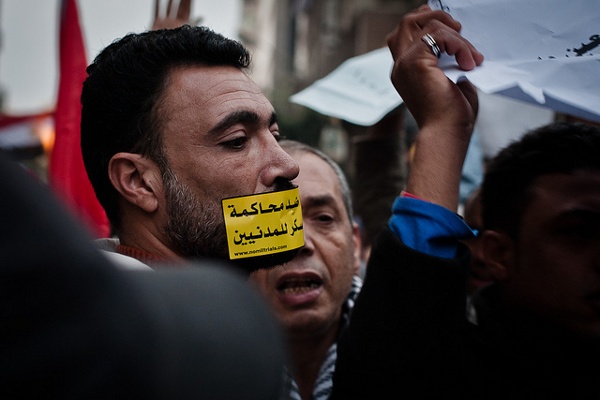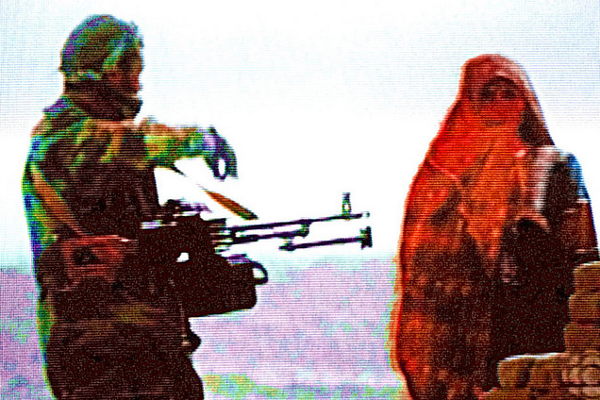
By: Yotam Ronen – January 9th, 2011
In the morning, we arrived to the compound for Israeli prisoners, one of the many built for over 6.000 Palestinian currently imprisoned by Israel. The compound contains a huge prison and a military court, in which prisoners, young as old, are judged by Israeli military officers. In the prison there is no racism or discrimination because everybody, with no exception, has the right to an unjust trial.
There are two cells at the entrance of the military court: a small one for those arriving from the Israeli side and a bigger one, where Palestinian detainees and their families are always waiting. Most of the prisoners’ relatives went through a long and expensive journey in order to meet their loved ones even for only a few minutes.
Just like every other thing during this day, as the long wait to enter, everything is part of a well-planned game between the visitors and the guards. Even when they have a clear list of the visitor’s names, they do everything they can to delay and humiliate family members, and despite some of the guards are Arab speakers, they command with a few basic words and a variety of orders that they enjoy using in order to demonstrate the hierarchy of the occupation. So, the rules are very simple: one needs to beg and the guard will choose when he/she feels like letting you in.
Right after our arrival we saw Abu Hanni and his wife, Im Fathi, approaching us from the Palestinian side. Abu Hanni, a man in his late 60’s, attacked us directly with his walking stick. Born in Yaffa in 1945, the long years of life under occupation have given him a cynical and sarcastic approach towards his surrounding; this old timer that lost three of his sons in combats with the Israeli army, is now awaiting the hearing of his youngest son, Fathi.
We are also here to meet Fathi and his friend Jaudat. Both of them were arrested in the middle of the night a month ago in their village of Qarawat Bani-Zeid. They were kidnapped by the army during a massive military operation, as part of a wave of arrests meant to oppress the popular resistance in the villages of An Nabi-Salih, Qarawat, Beit Rimma and Kufer Ein.
The resistance arose in late 2009 around the issue of expropriated agricultural lands belonging to the town of Nabi Salih and the villagers that surrounded it, where an ancient spring used by the villagers is located. The spring was declared an “archaeological site” two years ago, and the entrance was prohibited by the army. Still, the Jewish settlers that live in the nearby settlement of “Halamish” are using it on a daily basis.
After several non violent actions intended to claim back the spring that were responded violently by the army and ended up in confrontations with the settlers, the Palestinians decided to turn the protest into a weekly demonstration, going out to the streets with the goal of reaching their lands, symbolizing a protest against all aspects of the occupation.
The uprising of the villagers has led to big demonstrations with participation of hundreds of youths, men and women from the four surrounding villages and in collaboration with Israeli and international activists. Right from the beginning, the demonstrations were characterized by a high level of violence from army and police; using non lethal weapons including tear gas, various types of rubber bullets, sound bombs and more, in an attempt to oppress the demonstrations and resulting in dozens of people injured.
After futile attempts to oppress the demonstrations, the army’s tactics changed turning to mass arrests in which the youths were the main target. Fathi and Jaudat are part of a group of over 40 people that were arrested in response to the demonstrations and, like most of the other arrestees, their indictments include a single accusation of stone throwing. In the trial, there is no need for a specific date in which the alleged event took place, rather there are general descriptions “ …a few times…between march and august..”, there is no need for witnesses or evidence and the court relies entirely in the results of the investigation that the arrestees went threw.
We met Fathi in the demonstrations in Nabi Salih many months ago. He was one of the big group of youths from Qarawat that arrived on a regular basis. At the beginning, he arrived with the other boys, but soon enough our connection strengthened and he used to wait for us in the center of the village and ride with us the rest of the way to Nebi Salih, always laughing, always smiling even in the harsh situations that we experienced, up until the last hours before his arrest when he didn’t forget to send us a text message bravely saying: “my time has arrived and I shall see you in a few months…”.
Back in offer compound the metal gate finally opens up and the warden let us in the security check, every step that we take is followed by looks and comments that are only meant to demonstrate control. Nothing is allowed in besides cigarettes and money, no water, not a book and definitely not a phone. After we put our shoes threw the x-ray machine, and we walk threw the metal detector that doesn’t beep, we are led into a small room for a final humiliating full on body search.
We entered the wide yard with a blazing august sun in the sky, leaving no corner of shade to hide in. We sat down, hoping to hear the names of Fathi and Jaudat being called but this hopes turned to be false because in the prison there is no order: the names of the detainees appeared on an electronic board but there was no indication or evaluation for an exact hour for the hearings. Family members arrived at 7:30 in the morning, but they often have to wait until late afternoon for the hearing they came for, one that might not even take place. Waiting is based on tension and expectation for a name to be called upon.
We sat in the yard, talked and laughed with Fathi’s parents, who didn’t look too excited; after all they had been through given the occupation, now they just wanted to see their 16 year old son that grew up too fast. For many families, this court hearings are the only time they can see their family members; visits are allowed only after the detainees are sentenced – a process that can last months -, to ask for their well being, to pass on news from the family and village and to smile at them.
The hours passed and the heat didn’t let go. Just around 14:30 they finally called their names and we hurried to room number four. There they were, sitting close to us, dressed up with horrible brown prison uniforms. Fathi had his hair cut, he didn’t look so good but he smiled anyway; still, you could see the tiredness on his face. Jaudat didn’t stop looking at us for a moment. Later, we would find out that his family didn’t arrive because they were not informed about the right date of his hearing.
The man that runs the court is some kind of high ranking officer, one that acts as a janitor, sitting comfortably and looking at the show that is being held right in front of his eyes. The prosecutor, a thin religious young man speaking in a heavy French accent is the only one handling the situation in a serious manner. Since neither of the boys have a lawyer to represent them the hearing lasts less than 10 minutes, but even in cases where a lawyer is present, and even when the lawyer is Israeli, the way in which the hearing is being held, is far from being sane. The hearings themselves are conducted in Hebrew while a soldier acts as a translator, his duty is to translate to the prisoners the exact words that are being said, but actually, he sometimes translates a whole sentence, other times random words, and the rest of the time he is busy answering phone calls. Besides, most of the times the soldier is flirting with soldier girls that arrive to keep him company, and in some cases he would just fall asleep. All of this time, the hearing was being held over the heads of the prisoners that usually don’t understand none of the process except for their charges and the time for the next hearing.
The judge assigned for Fathi and Jaudat decided to schedule their next hearing two months after. Quickly and simply, with no doubts, he kept them in custody. No one was in a hurry, they would anyway be found guilty of a crime they did not commit and the time waited in prison will just be deducted of the punishment they will receive. Those who are arrested in demonstrations and are charged with stone throwing will sit in jail in most cases, the processes is simple: the first days after their arrest they are put threw a series of investigations and tortures that have two goals: the first one is to make them confess to the acts, whether they committed them or not; and the second goal is to get information out of them about their friends in order to frame them as well.
The army investigators, in a smart combination of force and false promises give the youth a simple choice: one confesses and spend 5-8 months in prison or one doesn’t confess and might even be acquitted, but the process itself can take up to years in which one will be held in prison waiting for trial. The combination of fear, torture, false promises and the fact that in many cases these youths are the bread winners of their families, leads many of them to confess to their charges brought against them.
This way of oppression is not new; it’s part of the sophisticated system of repression that was developed by Israel in order to crash any kind of popular uprising. Before Nabi Salih, the village of Nil’in suffered a similar attack that resulted in sixty of its inhabitants imprisoned at the same time. The system of repression did not succeed in braking the spirit of the villagers, although it did manage to weaken considerably the power of the demonstrations by hurting their leading forces.
The hearings of Fathi and Jaudat were over and the hearing of the third man that was sitting beside them started. He looked insecure but he was determined to say something to the court; the judge approved unwillingly and he stood up proudly and addressed to all the people that are present: “my confession was taken out of me while using force and torture, I do not recognize the existence of the state of Israel and of this trial..” . He stood still while the soldier translated his words to the judge that in return looked at him with lingering eyes.
In the last cell we said our goodbyes to Abu Hanni and Im Fathi. When the last gate finally closed after us, when we were supposed to feel “free” and “liberated”, we stood next to our cars quietly. There was nothing that would make our spirits feel better; all we could do is think of those that even the smallest amount of freedom has been taken away from them just because they chose not to be silent.
Si encuentras un error, selecciónalo y presiona Shift + Enter o Haz clic aquí. para informarnos.



